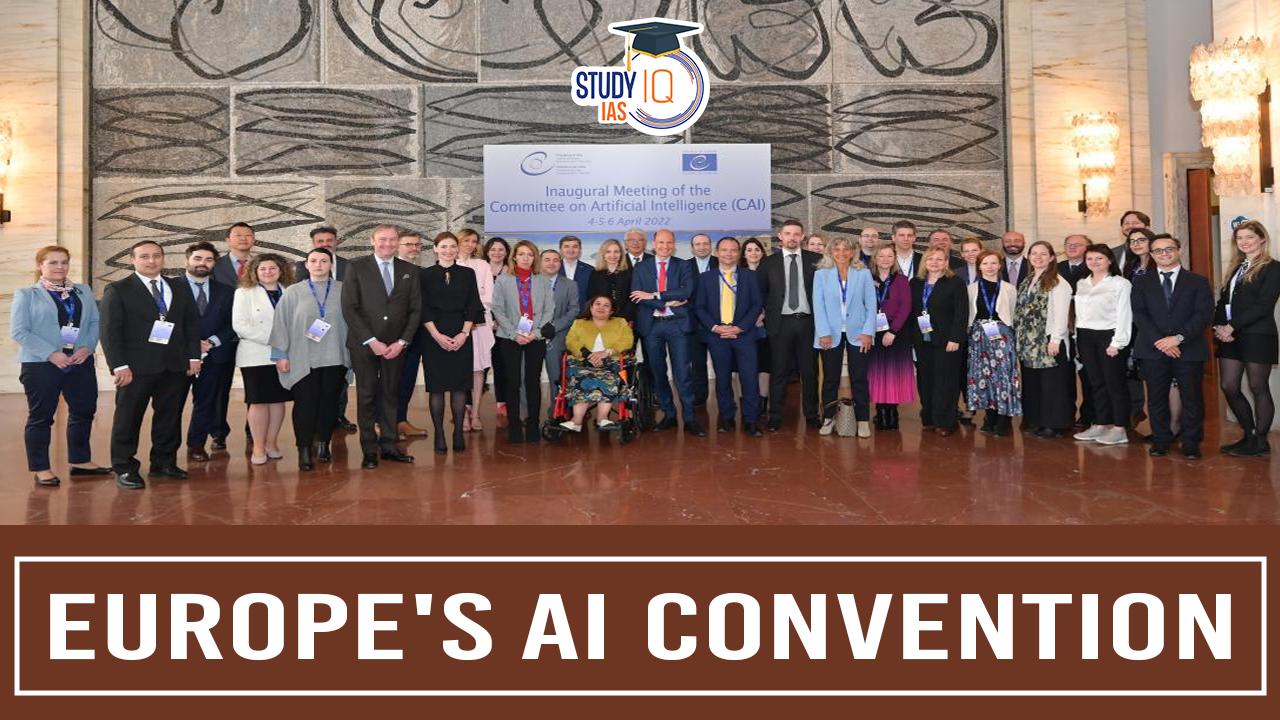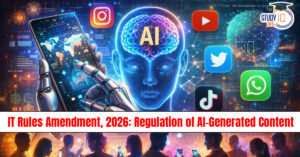Table of Contents
Context: As AI technology advances rapidly, global governance of AI is becoming increasingly complex. While various countries have implemented their own regulations, there is a lack of a binding international treaty.
Europe’s AI Convention: Introduction
- The global governance of Artificial Intelligence (AI) is becoming increasingly complex as countries attempt to regulate AI within their borders through various means, including laws and executive orders. Despite calls for a global AI treaty, significant obstacles hinder its realisation. ‘
- In this context, the Council of Europe (COE) has taken a significant step by adopting the Framework Convention on Artificial Intelligence and Human Rights, Democracy and the Rule of Law, known as the ‘AI convention’.
Council of Europe (COE) and the AI Convention
- COE Formation and Membership: Formed in 1949, the COE is an intergovernmental organisation with 46 member countries.
- Adoption of AI Convention: The AI convention links AI governance with human rights, democracy, and the responsible use of AI.
- It will be opened for signature on September 5.
About Framework Convention
- A framework convention is a legally binding treaty that outlines broader commitments and objectives, setting mechanisms to achieve them.
- Specific targets are set through subsequent agreements called protocols.
- Example: The Convention on Biological Diversity is a framework convention, while the Cartagena Protocol on Biosafety is a protocol under it.
- Advantages:
- The framework convention allows flexibility while encoding core principles and processes.
- Parties can decide how to achieve the objectives based on their capacities and priorities.
- It can inspire similar conventions regionally and influence AI governance in the U.S. as the U.S. is a COE member.
Scope of the Convention
- Article 1: Ensures that AI system activities are consistent with human rights, democracy, and the rule of law.
- Article 3: Covers AI system activities with potential impacts on human rights, democracy, and the rule of law.
- Applies to activities by public authorities or private actors on their behalf.
- Addresses risks from private actors’ AI activities in line with the convention’s objectives.
- Human Rights Protection (Article 4): Ensures AI applications do not infringe on existing human and fundamental rights.
- Democratic Integrity and Rule of Law (Article 5): Protects democratic processes and respects the rule of law.
- Though not explicitly mentioned, disinformation and deep fakes are implicitly addressed.
- Beyond Commitments (Article 22): Parties can exceed the specified commitments and obligations.
- Effective Remedies (Article 14) and Procedural Safeguards (Article 15): Governments are expected to install effective remedies and procedural safeguards to mitigate AI risks.
- National Security Exemptions
- Articles 3.2, 3.3, and 3.4 exempt national security interests, research, development, testing, and national defence from the convention.
- Military AI applications are not covered, reflecting a pragmatic move due to lack of consensus on their regulation.
- Broad exemptions don’t entirely exclude national security and testing from the convention’s applicability.
Importance of the AI Convention
- Human Rights Assertion: The convention reinforces that existing human and fundamental rights must remain protected during AI applications.
- Governmental Obligations: Primarily directed at governments to ensure effective regulation and protection measures.
- Comprehensive Risk Mitigation: Addresses comprehensive risks from AI to human rights and democratic processes.
Implementation Challenges
- The convention aims to address risks to human rights and democracy posed by AI.
- Implementation challenges are anticipated due to evolving AI technology and underdeveloped regulatory regimes.


 BharatSHRI Initiative: Digital Repositor...
BharatSHRI Initiative: Digital Repositor...
 IT Rules Amendment, 2026: Regulation of ...
IT Rules Amendment, 2026: Regulation of ...
 Tarique Rahman: From Exile to Prime Mini...
Tarique Rahman: From Exile to Prime Mini...




















